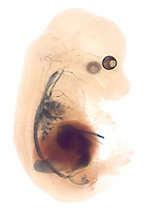Developmental Biology
 There have been dramatic advances in recent years in our understanding of problems in developmental biology. Many questions in this discipline were formulated decades ago, but have been intractable because of the lack of adequate methods to study them. The availability of recombinant DNA techniques has revolutionized the field by enabling investigators to define critical steps in transcription and processing of developmentally regulated genes. New methods for producing monotypic antibodies have provided very precise analyses of changes in the levels of specific proteins, changes in the cell surface in embryonic cells or changes in the localization of proteins within those cells. Analysis of developmentally-controlled genes and their regulatory regions has allowed identification of specific transcription factors and related cascades of controlling reactions that couple one signal to the expression of a new constellation of proteins in the cascade. Complex developmental phenomena, such as cell determination, the control of cell differentiation, and embryonic induction of pattern formation, are becoming amenable to systematic analysis and promise an exciting challenge for the future.
There have been dramatic advances in recent years in our understanding of problems in developmental biology. Many questions in this discipline were formulated decades ago, but have been intractable because of the lack of adequate methods to study them. The availability of recombinant DNA techniques has revolutionized the field by enabling investigators to define critical steps in transcription and processing of developmentally regulated genes. New methods for producing monotypic antibodies have provided very precise analyses of changes in the levels of specific proteins, changes in the cell surface in embryonic cells or changes in the localization of proteins within those cells. Analysis of developmentally-controlled genes and their regulatory regions has allowed identification of specific transcription factors and related cascades of controlling reactions that couple one signal to the expression of a new constellation of proteins in the cascade. Complex developmental phenomena, such as cell determination, the control of cell differentiation, and embryonic induction of pattern formation, are becoming amenable to systematic analysis and promise an exciting challenge for the future.
At the University of Virginia, developmental biology is the major research interest of many faculty members. Research areas range from molecular analysis of alternative RNA splicing in different cell lines to highly integrated aspects of cell movement during embryological development and determination of tissue type. Several groups are concerned with understanding the structure and regulation of specific genes in differentiating cells. There is considerable intellectual exchange among members of these groups to keep abreast of this rapidly changing field. Other investigators are interested in the signals controlling cell determination and differentiation, including those involved in specific embryonic tissue interactions and the differentiation of highly synchronous populations of cultured embryonic cells. Several groups are studying the processes of oogenesis and spermatogenesis; the development of egg and sperm are intriguing models for cell differentiation and are of obvious importance in reproductive biology. These groups work not only on many different areas of developmental biology, but also on many different organisms, from Drosophila to mammals. The major topics of interest among the researchers in this group of the Cell and Molecular Biology program at the University of Virginia are the developmental process in Drosophila and the development of the reproductive system in vertebrate animals. A University-wide Developmental Biology Training Grant provides a formal network for communication among these groups.
Faculty in this area:

Deppmann, Christopher
Elucidating and Understanding the Mechanisms Underlying Nervous System Development

DeSimone, Douglas W.
Cell Adhesion and Adhesion-Dependent Cell Signaling in Vertebrate Morphogenesis

Hirsh, Jay
Molecular genetics; development and function of neurotransmitter-synthesizing neurons in Drosophila

Jiang, Hao
Regulation of stem cell function and tumorigenesis by epigenetics and biomolecular condensation (phase separation)

Kucenas, Sarah C
The role of glia in the development, maintenance and regeneration of the nervous system

Lu, Xiaowei
Wnt/PCP signaling in inner ear development Mouse models for human deafness Wnt/PCP signaling in neural tube closure

Mohi, Golam
Cell signaling, stem cell biology, molecular and epigenetic mechanisms of blood and breast cancers

Stukenberg, P. Todd
Mechanisms of chromosome segregation in Mitosis and generation of Chromosomal Instability in tumors

Winckler, Bettina
Endosomal function and dysfunction in neurons. Development of the nervous system: cytoskeleton and membrane traffic in axon and dendrite growth.

Wotton, David
Regulation of Gene Expression, Development and Tumor Progression by TGF beta Signaling

Zang, Chongzhi
Bioinformatics methodology development; Epigenetics and chromatin biology; Transcriptional regulation; Cancer genomics and epigenomics; Statistical methods for biomedical data integration; Advanced machine learning; Theoretical and computational biophysics











